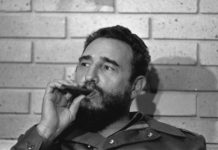
Crammed in between the red brick houses of the Phibsboro area of Dublin’s northside, Dalymount has been praised as embodying the working class values of football by, among others, Scottish writer and avid Bohs fan, Irvine Welsh.
However, for the last five years it seemed that the property crash was going to mark the end for what is Ireland’s most historic football ground and the home of League of Ireland Premier Division Club Bohemian FC.
Having been offered a deal of €60 million plus a new ground, which all but one of the club’s 400 members felt was too good an offer to refuse, the ground was sold to Liam Carroll, then one of Ireland’s leading property developers. Carroll went bust and it seemed that the banks would dispose of Dalymount with the famous turf making way for apartments. That was until a supporters’ campaign and the skilful leadership of the club’s board members persuaded Dublin City Council to buy the ground.
LookLeft spoke to Bohemian FC Director, Daniel Lambert, about saving Dalymount and the future of what has been christened Dublin’s ‘People’s Club’.
Dalymount has been saved from destruction, who were the main players and events which made it possible?
Dalymount Park has been saved and the iconic stadium site will be fully redeveloped into a new stadium with multiple community gain elements incorporated into the site. This is the culmination of many years work by a host of people. The people who deserve most credit and plaudits are the ordinary members and supporters of the club, who have, since 2010, allowed the club breathing space in very difficult circumstances to engineer a solution to an almost impossible solution by consistent fundraising, lending and volunteer efforts.
The actual deal was principally negotiated by myself, former Club President, Chris Brien and our current Club President, Matt Devaney. We also had huge support from local elected representatives and the entire community.
What is the historical importance of Dalymount?
The historical importance of Dalyer cannot be underestimated; the place is part of the fabric, not only the Northside of Dublin, but of the entire country. It has played a massive role in the sporting, cultural, musical and even political history of the state. Apart from being the home of Bohemian FC since 1901, Dalymount was also the Republic of Ireland’s international football venue from 1904 to 1990. During these years the pitch was graced by the presence of footballers such as Pele, Zidane, Van Basten, Bobby Charlton, Stapleton and Giles. The venue also hosted some of the great boxing bouts, involving boxers such as Jack Doyle in the 1940s and more recently Barry McGuigan in the 1980s.
Dalymount was also the venue of Dublin’s first ever outdoor festival gigs, Bob Marley, Thin Lizzy, Sonic Youth and Motorhead played the venue.
Culturally the ground is also of great historical significance. Poet Oliver St John Gogarty played for Bohemian FC in Dalymount; Douglas Hyde attended the first soccer match of an Irish President in 1936 and was thrown out of the GAA for it. In 1966, 200 veterans of the 1916 Rising accepted a special invitation to attend the FAI cup final in Dalyer from the FAI, among them President Eamon de Valera. It’s reported that the veterans paraded in the centre of the pitch before taking their place in a special seating area in the stands.
In recent years Bohs has developed a clear image as a multi-cultural and progressive club, how has this come about?
I began, a number of years ago to try to uncover the ‘true identity’ of Bohemian FC – something that everyone knew existed beyond being just a football club but was hard to verbalise and transmit.
What became clear is that, being a fully members-owned and operated democratic club we had some naturally Left leaning, progressive qualities. We did not seek to be overtly political but did find that we were, as a club, fully inclusive, progressive and welcoming to all. We are a true “people’s club”, free from corporate interference or hierarchical ownership structures and this should be celebrated and embraced. Bohemian FC gives power to the people in the truest sense of the term – we are fully in control of our own destiny at all times. A group of ordinary men and women, young and old, from every background imaginable running the oldest football club in Dublin – it’s special.
What moral do you think there might be for other football clubs in Ireland that can be drawn from the Dalymount saga?
I think the biggest lesson to be drawn from the saga is that football clubs, when they are truly inclusive, transparent, and attempting to be a force for good in their respective communities can achieve the seemingly impossible. It would be wrong to ignore the role that Dalymount Park, given its own history and recognition played in the saga, but crucially it was our own ordinary members, supporters and the assistance of huge numbers of people in the local community that allowed this to happen.
What plans are there to further develop the Bohs image and link with its local communities?
As a club our number one top level goal is to become embedded in the North Dublin community through inclusiveness, equality and charitable activities. We have recognised that our true purpose is to contribute to the local communities which we in turn look to for support and assistance. Football success on the pitch will follow – the foundations of our club were built upon the concept of “active members” – members volunteering their time to enable the club to grow and prosper and that has not changed. We have formally established “The Bohemian Foundation” which is a section of the club that focuses solely on community integration.
What fires your involvement in the club and what hopes for Irish football do you have and what needs change in order for these to happen?
I love the club more than anything – it represents everything that has been lost in modern football. Our players play for very small amounts of money and love the club and fans. We don’t have an owner or stock exchange listings etc. We are a model of social inclusion – anyone can join and have the same impact as every other person – no more no less. We were established in 1890 and now, 125 years later, we remain true to the ideals of the club.
I just hope that the Irish public can embrace the special qualities that exist in Irish football. Many clubs are now being run by their supporters and offer an escape from the runaway train of corporate football demonstrated by the FIFA scandal and the ever-increasing ticket prices and obscene amounts of money being paid to players in the Premier League.
For me, footballing success on the pitch is secondary – the clubs need to ‘mean something’ to their communities. They can do this by putting their communities and supporters first, provide for them, welcome them, assist them…..if they do this with honesty, commitment and integrity the league will prosper.




